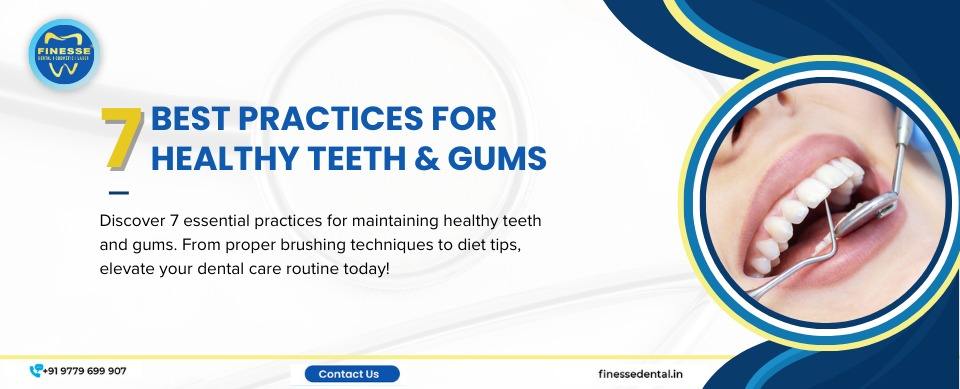- April 6, 2024
- Comment: 0
- Blog
7 Best Practices for Healthy Teeth and Gums
Maintaining good oral health is essential for overall well-being. From preventing tooth decay to avoiding gum disease, taking care of your teeth and gums is crucial for a healthy smile and a confident demeanor. In this article, we’ll explore practical tips and best practices for achieving optimal oral health.

1. Brushing Techniques
Brushing your teeth twice a day is the cornerstone of oral hygiene. Use a soft-bristled toothbrush and fluoride toothpaste to gently clean all surfaces of your teeth. Remember to brush for at least two minutes, covering the front, back, and chewing surfaces. Pay special attention to the gumline and hard-to-reach areas to remove plaque and bacteria effectively.
2. Flossing Essentials
Flossing is just as important as brushing for removing plaque and food particles from between your teeth. Incorporate flossing into your daily routine, preferably before bedtime. Gently slide the floss between each tooth and along the gumline, making a C-shape to hug the tooth. This helps clean areas that your toothbrush can’t reach, reducing the risk of cavities and gum disease.
3. Choosing the Right Toothpaste
Selecting the right toothpaste is crucial for maintaining oral health. Look for a toothpaste that contains fluoride, a mineral that strengthens tooth enamel and prevents decay. Consider factors like sensitivity, whitening, and tartar control when choosing a toothpaste that meets your specific needs. Consult with your dentist if you have any concerns or questions about toothpaste selection.
4. Healthy Eating Habits:
A balanced diet plays a significant role in oral health. Limit sugary snacks and beverages, which can contribute to tooth decay. Instead, opt for nutritious foods like fruits, vegetables, lean proteins, and dairy products. These foods provide essential vitamins and minerals that support strong teeth and gums. Drinking plenty of water also helps rinse away food particles and maintain hydration.
5. Avoiding Harmful Habits
Certain habits can harm your oral health and lead to dental problems. Avoid smoking and tobacco use, which increase the risk of gum disease, tooth decay, and oral cancer. Limit consumption of acidic and sugary foods, as they can erode tooth enamel and cause cavities. Practice stress-reducing techniques like meditation or yoga to prevent teeth grinding and jaw clenching, which can damage teeth over time.
6. Regular Dental Check-ups
Routine dental visits are essential for maintaining optimal oral health. Schedule regular check-ups with your dentist every six months for professional cleanings and exams. Your dentist can detect any dental issues early on and provide necessary treatments to prevent them from worsening. Additionally, dental hygienists can remove plaque and tartar buildup, reducing the risk of gum disease and tooth decay.
7. Practicing Good Oral Hygiene Habits
In addition to brushing and flossing, incorporate other oral hygiene habits into your daily routine. Use mouthwash to rinse away bacteria and freshen breath, but avoid alcohol-based mouthwashes, which can dry out your mouth. Clean your tongue with a tongue scraper or toothbrush to remove bacteria and prevent bad breath. Finally, replace your toothbrush every three to four months or sooner if the bristles become frayed.
Achieving optimal oral health requires a combination of consistent oral hygiene practices and healthy lifestyle choices. By brushing and flossing regularly, choosing the right toothpaste, maintaining a balanced diet, avoiding harmful habits, scheduling regular dental check-ups, and practicing good oral hygiene habits, you can keep your teeth and gums healthy for a lifetime. Remember, investing in your oral health now will pay off with a beautiful smile and improved overall well-being.

